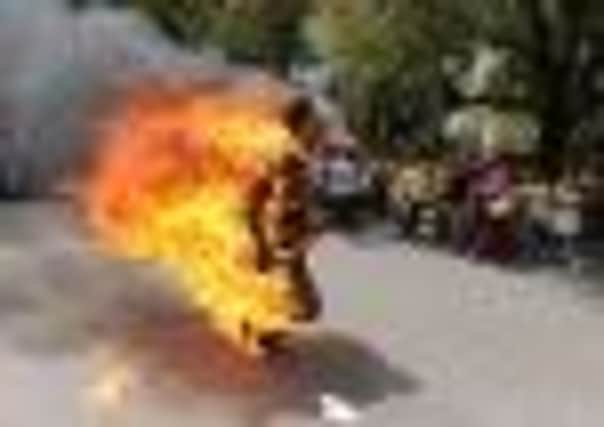Tibet protests spread as man sets himself on fire in India


Indian police, who had already tightened security in New Delhi for president Hu Jintao’s visit, swept through the protest a few hours later, detaining scores of Tibetans.
The man apparently doused himself with something highly flammable and was engulfed in flames when he ran past the podium where speakers were criticising China and Hu’s visit.
Advertisement
Hide AdAdvertisement
Hide AdFellow activists beat out the flames with Tibetan flags and poured water on him. He was on fire for perhaps two minutes, but some of his clothing had disintegrated and his skin had black, burned patches by the time he was taken to hospital.
The man, identified as Jamphel Yeshi, sustained burns on 98 per cent of his body and his condition was said to be critical, according to the Association of Tibetan Journalists.
Protesters initially prevented police from taking him to the hospital, but officers eventually forcibly took him away.
Mr Yeshi, 27, left Tibet in 2006 and had been living in New Delhi for the past two years, activists said.
Mr Hu is expected to arrive in India tomorrow for a five-nation economic summit.
While activists had been whispering on Monday morning that something dramatic was expected at the protest, organisers insisted they were not behind the self-immolation.
“We have no idea how this happened, but we appreciate the courage,” said Tenzing Norsang, an official with the Tibetan Youth Congress.
He called on participants at the summit to discuss Tibet.
“If you care about peace you should raise the issue of Tibet,” he said. “Hu Jintao is responsible for what is happening there.”
Advertisement
Hide AdAdvertisement
Hide AdThe New Delhi protest comes amid a series of self-immolations in ethnically Tibetan areas of China. About 30 people – many of them monks or nuns, and often in their teens or early 20s – have set themselves on fire over the past year, calling for the return to Tibet of the Dalai Lama and in protest over Chinese rule in their homeland.
The Dalai Lama, who fled Tibet during a failed 1959 uprising against Chinese rule, has blamed China’s “ruthless policy” for the self-immolations. China accuses the Dalai Lama of stirring up trouble.
On Saturday, a state-run Chinese website set up in 2000 to present the government’s perspective on Tibet, accused the Dalai Lama of instigating the self-immolations and advocating Nazi racial segregation ideas.
The website was critical of the Dalai Lama’s comments that government policies – including the increased use of the Chinese language in Tibetan schools and the migration of ethnic Han Chinese into Tibetan areas – were eroding Tibetan culture.
“The Dalai Lama still treats himself as the serf owner, Tibet as his property and Tibetan people as his slaves,” the site said.
The website also called the Dalai Lama a “tricky liar skilled in double-dealing” who wants to build a “Berlin Wall” of ethnic segregation and confrontation.
“The remarks of the Dalai Lama remind us of the uncontrolled and cruel Nazi during the Second World War,” the commentary said in criticising the Dalai Lama’s call for high levels of autonomy for Tibetan areas.
At the site of the protest yesterday, a large poster of Mr Hu with a bloody palm print over his face said: “Hu Jin Tao is unwelcome” at the summit.
Advertisement
Hide AdAdvertisement
Hide AdMore than 600 demonstrators marched across New Delhi to a plaza near the Indian Parliament in protest at Mr Hu’s visit.
Some carried posters saying “Tibet is burning” or “Tibet is not part of China”. China says Tibet has always been part of its territory. Tibetans say the Himalayan region was virtually independent for centuries.
This was the second Tibetan self-immolation in India in recent months. Last year, a young Tibetan exile set himself on fire outside the Chinese Embassy, suffering minor burns.
“This is what China faces unless they give freedom to Tibet,” Tenzin Dorjee, a witness to yesterday’s incident, said.
Mr Hu will be attending a summit this week of the leaders of Brazil, Russia, India, China and South Africa, who form a grouping known as BRIC countries.